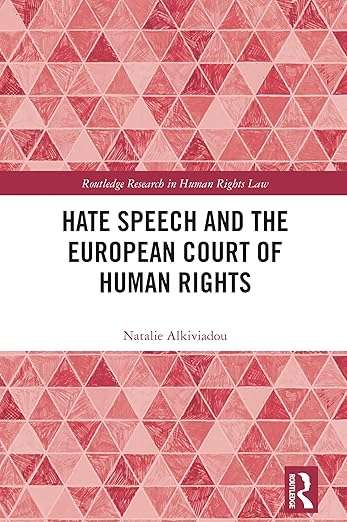The Volokh Conspiracy
Mostly law professors | Sometimes contrarian | Often libertarian | Always independent
Natalie Alkiviadou Guest-Blogging About "Hate Speech and the European Court of Human Rights"

I'm delighted to report that Dr. Natalie Alkiviadou, Senior Research Fellow at the Future of Free Speech at Vanderbilt University will be guest-blogging this week about this new book of hers. Here is a summary of the book, from the publisher:
This book argues that the European Court of Human Rights (ECtHR) should reconsider its approach to hate speech cases and develop a robust protection of freedom of expression as set out in the benchmark case of Handyside v the United Kingdom. In that case, the ECtHR determined that Article 10 of the European Convention on Human Rights (ECHR), safeguarding the right to freedom of expression, extends protection not only to opinions which are well received but also to those deemed offensive, shocking, or disturbing. However, subsequent rulings by the Court have generated a significant amount of contradictory case law.
Against this backdrop, this book provides an analysis of hate speech case law before the ECtHR and the now-obsolete European Commission on Human Rights. Through a jurisprudential analysis, it is argued that these institutions have adopted an overly restrictive approach to hate speech, which fails to provide adequate protection of the right to freedom of expression. It also demonstrates that there are stark inconsistencies when it comes to the treatment of some forms of 'hate speech' versus others.
The study further contends that, in reaching its decisions on hate speech cases, the Court disregards empirical evidence on matters related to free speech restrictions. Viewing the ECHR as a 'living instrument,' the book places this analysis within the current state of affairs vis-à-vis the handling of hate speech, particularly online, by European countries, the European Union itself and social media platforms, actions which the author argues are contributing to a free speech demise. The book will be a valuable resource for academics, researchers and policymakers working in the area of law, political science, European studies and sociology.
And some blurbs:
"In the coming years, important regulations for major online platforms will likely arise from Council of Europe member states. European Court of Human Rights rulings will shape a complex global jurisprudence on online speech. Natalie Alkiviadou deserves praise for pioneering scholarship in this challenging and evolving field."
― Eric Heinze, Professor of Law and Humanities, Queen Mary University of London, UK.
"This important book presents an incisive analysis of the decisions concerning hate speech under the European Convention on Human Rights, offering a constructive critique of the case law's historic trajectory. In our interconnected world, the book's insightful analysis should inform debates far beyond Europe."
― Nadine Strossen, John Marshall Harlan II Professor of Law Emerita, New York Law School, USA
I very much look forward to her posts!
Editor's Note: We invite comments and request that they be civil and on-topic. We do not moderate or assume any responsibility for comments, which are owned by the readers who post them. Comments do not represent the views of Reason.com or Reason Foundation. We reserve the right to delete any comment for any reason at any time. Comments may only be edited within 5 minutes of posting. Report abuses.
Please to post comments


This sounds like something I would probably agree with, at least to some extent. But I do wonder whether this is serious academic work, or whether it is advocacy. Routledge is normally a serious academic publisher, but the summary above makes it sound like a CATO-project.
These are the same people that prosecuted Galileo, and put him on house arrest for life. He said, the earth goes around the sun, not the opposite. Galileo went way beyond hate speech to heresy.
Too bad for these people if all -isms and -ophobias are true. PC is a masking ideology for Marxism. Class warfare does not work. They replaced it with the oppression of minorities.
Wow, European health care must be lots better than I thought, if there are supercentenarian policymakers floating around.
Oh, hey, another guy that doesn't know that "people" refers to a group identity rather than specific individuals.
The concept of "hate speech" is too vague to have any application that is consistent with free speech. Putting aside that even "hate speech" that we all agree is such should be protected, it seems like any definition of that term seems to devolve into encompassing all speech that one dislikes.
Because speech might be caustic or very offensive is a reason TO protect it, not to ban it.